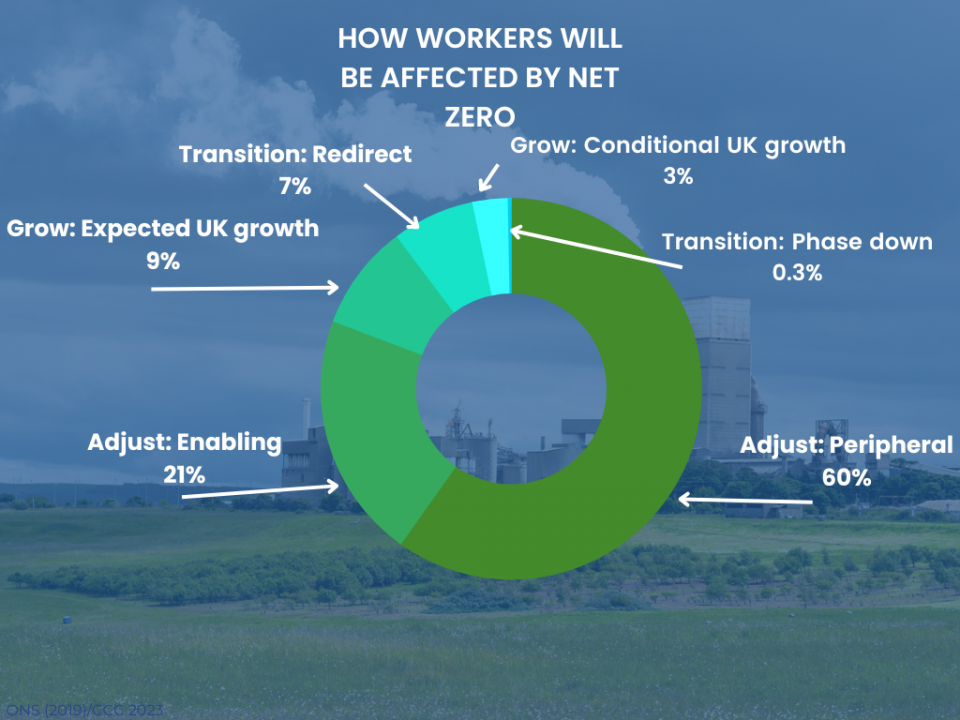The Climate Change Committee (CCC) has released a new briefing that outlines how achieving net zero can offer ‘real levelling up,’ as long as the government gets behind green jobs.
Titled A Net Zero Workforce, the report outlines how achieving net zero carbon emissions would help to deliver the levelling up goal as it will already transform much of the UK economy. Not only will this deliver high-quality job growth and spread opportunity around the country, but many workers won’t see major impacts as a result of the transformation. In fact, only five percent of the current total workforce would see the largest changes, with those going towards the sectors that play a core role in the delivery of the net zero plans. The briefing shows that:
- Sectors such as building construction and retrofit, and electric battery manufacturing make up two thirds of those core sectors, with these showing the potential to grow during the net zero transition.
- Around 7% of workers in the UK are employed in sectors that will be able to gradually redirect their services. This will mainly be down the transformation brought on through using low-carbon methods as opposed to fossil fuels.
- High-emitting sectors are made up of less than 1% of the UK workforce, with these likely to be phased down during the transition to net zero. This includes areas where a decline in extraction must be seen, such as oil and gas.
Lord Deben, Chairman of the Climate Change Committee, said:
“The UK has committed to Net Zero. The only question is whether the Government intends to get there in a way that benefits workers or leaves them behind.
“This is a unique moment to tailor our approach to skills and jobs, in the certainty of achieving the legal goal. A net zero workforce means secure employment for the future. This is an opportunity for the government to bring real meaning to levelling up.”
Net zero has the potential to deliver between 135,000 and 725,000 new jobs in low-carbon sectors, including building retrofit, renewable energy generation and electric vehicles, with this showing significant net employment growth, however this is not guaranteed. In order to achieve this, the briefing states that the government must actively commit to reskilling and upskilling key areas of the workforce.
With the United Kingdom experiencing significant transitions in the past, the CCC’s briefing states that the net zero transition doesn’t carry the same risks as previous transitions such as the decline of goal and steel during the 1970’s and 1980’s. These past strategies saw abrupt business closures in areas of the country that saw concentrated regional employment, however any potential job losses in industries that will be affected by the move to net zero is likely to see this more gradually than the past coal and steel decline. Should the government provide sufficient clarity, workers and businesses are likely to have time to respond to changes.

As jobs are created through the net zero transition, employment can be provided for areas that are more economically deprived as necessary investment can be directed. The briefing states that:
- Sectors that are likely to see the largest employment growth include building construction and retrofit, transport, and low-carbon energy supply. These are industries that are spread around the United Kingdom and are also the sectors that are likely to see the fastest transitions as low-carbon technology is rolled out at pace.
- The Humber and South Wales are expected to see the first major sites for decarbonised industry as they exploit hydrogen and carbon capture, however other clusters could be located in Grangemouth, Teesside, Merseyside, and Southampton. These areas already employ manufacturing workers, with the North of England, the East Midlands, and Yorkshire and the Humber representing 16%, 9% and 21% of energy intensive manufacturing jobs respectively.
- Through targeted support, the net zero transition has the opportunity to increase diversity in the energy supply and construction sectors, with those industries historically having an under-representation of woman or ethnic minorities. These sectors are key net zero sectors as the nation looks to transition.



















